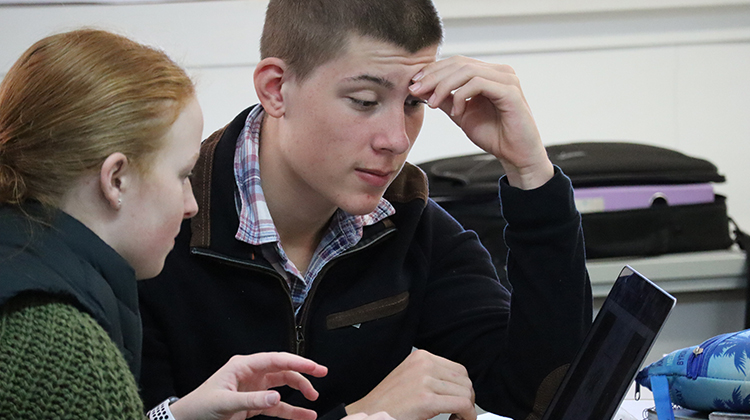Outback Kids get a Taste of the Weird World of Quantum

In a bootcamp held in Dubbo, the last big town before hitting the Outback, high school students got to ask some unusual questions: how do you manipulate data at the atomic level? Can particles really be in two places at once? And how do you get a job in this blossoming high-tech industry?
Led by prominent researchers from around the country, the Quantum Tech Camp - the third for high schoolers staged by Sydney Quantum Academy, but the first in regional Australia - saw students dive deep into the spooky quantum world. It was offered in partnership with the NSW Department of Education’s Regional Industry Education Partnerships (RIEP) program.
Students also learned about the massive potential of quantum technologies and the career pathways available in the field, which CSIRO estimates will likely create an Australian industry worth $6 billion and 19,400 jobs by 2045.
“I wasn’t very aware of the quantum world at all before this, and I didn’t realise that quantum computers existed,” said Emelia Hosking, 16, a student at the Central West Leadership Academy, a non-profit, non-denominational selective school in Dubbo.
“But it’s been really fun learning about quantum mechanics. I liked learning about superposition and interference, and how that can help you to figure out really long and complicated problems.”
Jett Pearse, 15, also a student at the school who took part in the camp, was intrigued by the seemingly illogical behaviour of particles at the sub-atomic level. “They’re very contrary to what you see around you in the world,” he said. “But I really enjoyed how you can use those aspects to solve a lot of problems in ways that are really, really unique.”
The camp, held 21-23 May 2024, was a mixture of in-person classes by physicists and online presentations by prominent researchers working at the frontiers of quantum science. In total, 52 students took part: 21 in person in Dubbo and another 26 joining online from other locations around New South Wales, plus three from Queensland and two from Tasmania, with a 60% of online students funded by scholarships from IBM.
In Dubbo, classes were led by Tristin Rice, a Stanford University physics graduate, and Abhik Sarkar, a PhD student at UNSW researching quantum computing theory. In person presentations were also given by Prof Peter Turner, CEO of Sydney Quantum Academy (SQA), and Astri Cornish, Quantum Workforce and Education lead at IBM in Australia.
“Quantum computers are not science fiction - they are here, and they are real,” Prof Jingbo Wang, director of the centre for Quantum Information, Simulation and Algorithms at the University of Western Australia, told students.
“A full-scale quantum computer will transform how we manage resources, design new drugs or new materials, and probably a million other things we have not even dreamed of yet. A global community of quantum researchers is making solid progress towards this goal in leaps and bounds every day.”
She was one of the researchers who presented virtual lectures, along with Dr Xanthe Croot, Chief Investigator of the Quantum Superconducting Circuits Lab at the University of Sydney; A/Prof Chris Ferrie of the Centre for Quantum Software and Information at UTS; Dr Linda Beaumont, Deputy Dean of Faculty of Science and Engineering of Macquarie University; and Dr Luke Mathieson, Deputy Head the School of Computer Science at University of Technology Sydney.
Lessons focussed on foundational knowledge and concepts in quantum mechanics, using the strange quirks of the quantum world for computation, how quantum algorithms work, as well as Python programming skills so students could run demonstrations of quantum computing with online simulators.
“I really enjoyed concepts like Schrodinger’s cat - that it can be both dead and alive at the same time, and then you can’t really figure out what it is until you observe, or measure it,” said Riyon Dharmwardane, 15, another of the Dubbo students. “And I liked the coding part … that was the most interesting for me.”
The camp was delivered by SQA in partnership with Qubit by Qubit, a U.S. non-profit specialising in online teaching of quantum skills who sent New York-based Tristin Rice to Australia especially for the camp. Additional online activities were delivered by Quantum Girls, a Perth-based national project which creates education programs for 11-15-year-old girls and helps train teachers in quantum science.
Since it was founded in 2019, SQA - a joint-venture between University of Sydney, UNSW, Macquarie University and the University of Technology Sydney which is supported by the New South Wales Government - has been working to grow the quantum ecosystem in Australia and make quantum education and training accessible to all.
“Quantum technologies are at the intersection of physics, computer science, and engineering - so they are a great way to explore a range of STEM topics,” said SQA’s Prof Peter Turner.
“And they’re going to be vital skills, since quantum technologies have potential applications in nearly every industry.”